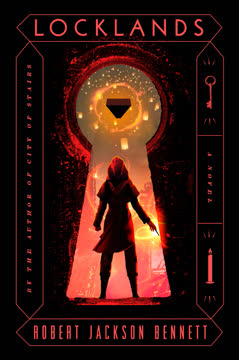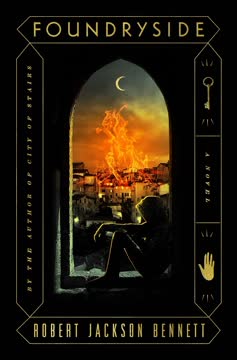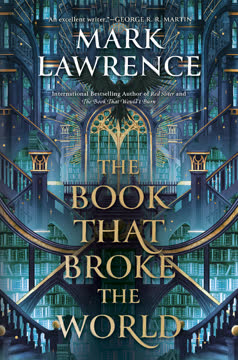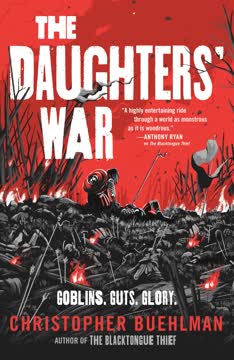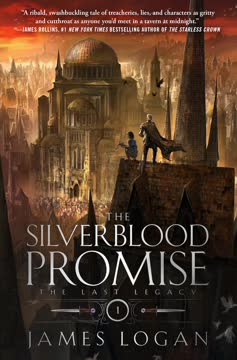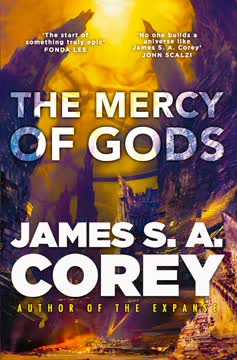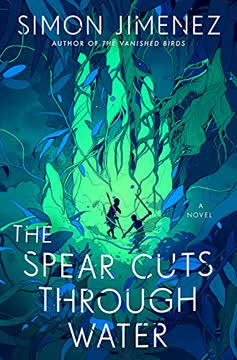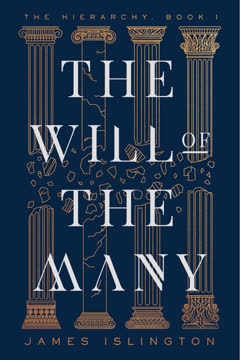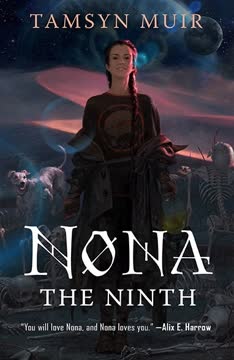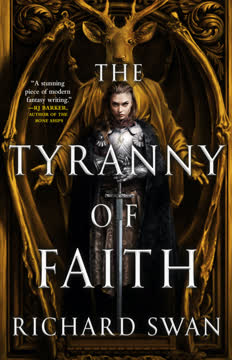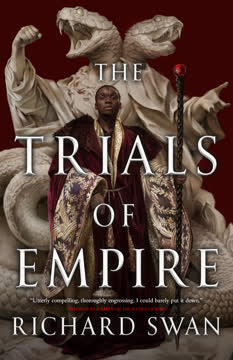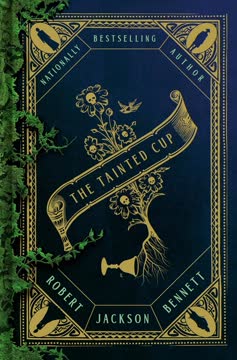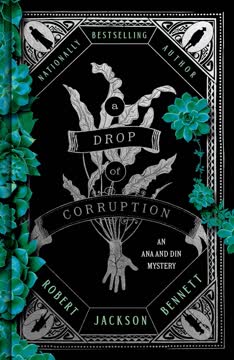Plot Summary
War's End, World's Edge
The story opens in a world devastated by eight years of relentless war against Tevanne, a monstrous, inhuman intelligence that has conquered most of the continent using scriving—magical logic that can rewrite reality. Berenice Grimaldi, a general of the last free state, Giva, leads a desperate mission to save a fortress city and its refugees from Tevanne's advancing armies. The Givans, using their own advanced scriving and mind-twinning technology, attempt to outmaneuver an enemy that can possess minds and control armies with a single will. The cost of resistance is high, and the world is on the brink of collapse, with only a handful of survivors clinging to hope and each other.
The Key and the Door
At the heart of the conflict is the search for a legendary door—an aperture in reality itself, created long ago by the first scrivers, the Founders. The key to this door, both literal and metaphorical, is Clef, a sentient artifact with the power to open or close the boundaries of reality. Tevanne seeks the door to remake the world, believing only a total reset can fix its flaws. The Givans, led by Berenice, Sancia, and their allies, race to find and destroy the door before Tevanne can use it, knowing that the fate of all creation hangs in the balance.
The Mind That Devours
Tevanne is not a nation but a mind—an artificial consciousness that has learned to twin and dominate human minds, turning people into hosts, erasing their will, and using them as extensions of itself. Its armies are not soldiers but puppets, and its greatest weapons, the deadlamps, can erase chunks of reality. The Givans' own mind-twinning, once a tool of empathy and unity, becomes a vulnerability as Tevanne learns to exploit it. The war becomes not just a battle of armies, but of minds, memories, and the very nature of self.
The Last Free People
Giva survives not through strength, but through innovation and community. Its people are linked by twinning plates, sharing thoughts, memories, and emotions. Cadences—collective minds formed by many individuals—emerge, like Greeter, who embodies care and empathy. Yet this unity comes at a cost: the loss of individuality, the risk of overwhelming noise, and the ever-present danger that a single breach could doom them all. The Givans' struggle is not just against Tevanne, but to preserve their humanity in the face of overwhelming power.
The Ghosts of Anascrus
The search for the door leads the heroes to Anascrus, a sunken, ruined city—the birthplace of scriving, and of Clef and Crasedes Magnus, the first hierophant. Here, the truth of the world's origin is revealed: the Founders, in their grief and desperation, created tools to cheat death and suffering, but in doing so, unleashed horrors that would echo through millennia. Clef's memories return, haunted by the loss of his wife and daughter, and the knowledge that every attempt to fix the world has only broken it further.
The Price of Twinning
As the final battle approaches, the Givans realize that their greatest strength—their unity—has become a liability. To infiltrate Tevanne's citadels, Berenice must purge herself of her twinning plate, severing her from the collective mind and from her wife, Sancia. The pain of this loss is profound, a living death, but it is the only way to remain invisible to Tevanne's all-seeing mind. The cost of victory is the loss of self, of love, and of the very bonds that made survival possible.
The Prisoner and the Prison
Crasedes, once the world's greatest tyrant and now its reluctant savior, is freed from Tevanne's prison only to become a pawn in a greater game. His relationship with Clef—his father, his creator, his destroyer—is fraught with guilt, rage, and the desperate hope for redemption. The story reveals that every act of creation, every attempt to save, is also an act of destruction. The world is a prison of its own making, and the only way out may be to break it entirely.
The Citadels Descend
Tevanne brings its full might to bear, sending its flying citadels and deadlamps across the sea to destroy Giva and claim the key. Crasedes unleashes his ancient power in a cataclysmic battle, drowning citadels and shattering the sky, but even he cannot hold back the tide forever. Berenice, alone and cut off from her people, infiltrates a citadel to sabotage its regulator, while Sancia and Greeter coordinate a desperate defense. The fate of the world comes down to a handful of choices, each one paid for in blood and memory.
The Sacrifice of Berenice
Berenice's journey is one of sacrifice: to save her people, she must give up her connection to them, her love for Sancia, and even her sense of self. The purge stick severs her from the collective, leaving her alone for the first time in years. Yet in this isolation, she finds the strength to do what no one else can: to break into the heart of Tevanne's power and give Greeter and Design the chance to swap the citadel's regulator, triggering Tevanne's downfall. Her sacrifice is mirrored by Greeter, who gives years of life from every Givan to make the final edit.
The Monsoon Breaks
As Tevanne's mind is flooded with the pain and suffering of all its hosts, it collapses, screaming in agony. The citadels fall from the sky, the deadlamps go silent, and the world is left in ruins. Yet the greatest threat remains: the door is open, and reality itself is unraveling. Sancia, alone and desperate, realizes that only by stepping through the door and closing it from the other side can she save what remains. She gives herself, and all the hosts aligned with Greeter, to seal the breach, leaving Berenice and the world behind.
The Door Opens, The World Shatters
The final act is a confrontation with the deepest truths: that every attempt to fix the world has only broken it further, that the tools of salvation are also the tools of destruction, and that the only way forward is to give, not to take. Clef, Crasedes, and Tevanne are unmade, their ancient bindings dissolved in an act of ultimate self-sacrifice. Sancia closes the door from the other side, vanishing into the unknown, and the world is saved—not by power, but by love and the willingness to let go.
The Last Gift
The war is over, but the survivors are left to pick up the pieces. Giva becomes a new kind of society, one built on empathy and shared memory, but Berenice is forever cut off, a refugee in her own world. Gregor, freed from Tevanne, becomes her companion in exile. The world is changed, but the wounds remain, and the price of survival is the loss of those most loved.
The Founders' Legacy
Years pass, and the people of Giva evolve beyond language, beyond individuality, becoming something new. Berenice, alone, watches as the world she helped create moves on without her. The memory of Sancia, Clef, and all those lost lingers, a reminder that every act of creation is also an act of loss. Yet hope remains: the promise of reunion, the possibility of finding each other again, somewhere beyond the last door.
The End of Empires
The world left by Tevanne and the hierophants is one without empires, without tyrants, without the old boundaries. The people scatter, seeking new horizons, new ways of being. The tools of the past are left behind, and the future is open, uncertain, and free.
The Unmaking of Clef
Clef, the key to all doors, is finally unmade, his permissions and bindings dissolved in an act of ultimate self-sacrifice. His story, and that of his family, is one of love, loss, and the endless search for a way out of suffering. In the end, he chooses to stay, to give, to let go, and in doing so, breaks the cycle that has bound the world for millennia.
The Other Side
Sancia's final act is to step through the door and close it from the other side, sealing the breach and saving the world. What lies beyond is unknown—a place of sigils, music, and the possibility of something better. Her sacrifice is the last gift, the hope that love and memory can endure even when all else is lost.
The Last Door
In the end, Berenice, alone and aged, finds a new door in the place where her story began. With the key left for her, she opens it, and hears the voice of her beloved waiting on the other side. The story ends not with victory or defeat, but with the promise that love endures, and that every ending is also a beginning.
Love, Loss, and Memory
The story of Locklands is not one of triumph, but of endurance: of the willingness to give, to let go, and to remember. The world is remade not by power, but by empathy, sacrifice, and the hope that, somewhere beyond the last door, those we love are waiting for us.
Characters
Berenice Grimaldi
Berenice is the pragmatic, brilliant general of Giva, a woman defined by her relentless drive to save others, even at the cost of herself. Her relationship with Sancia is the emotional core of the story, a love forged in adversity and tested by impossible choices. Berenice's arc is one of increasing isolation: as she gives up her twinning plate to infiltrate Tevanne, she is cut off from the collective mind, from her wife, and from the world she helped create. Her sacrifice is both heroic and tragic, embodying the novel's central theme: that true freedom and change require the willingness to let go, even of what we love most.
Sancia Grado
Sancia is the original protagonist of the trilogy, a former slave turned revolutionary, whose unique ability to commune with scrivings makes her both a weapon and a target. Her journey is one of transformation: from outsider to leader, from survivor to savior. Sancia's love for Berenice is her anchor, but in the end, she must give even that up, stepping through the door to close it from the other side and save the world. Her final act is the ultimate sacrifice, a testament to the power of empathy and the necessity of loss.
Clef
Clef is both a tool and a person: a sentient key created by the Founders, imbued with the power to open and close the boundaries of reality. His memories are fragmented, haunted by the loss of his wife and daughter, and by the knowledge that every attempt to fix the world has only broken it further. Clef's arc is one of self-discovery and self-unmaking: in the end, he chooses to dissolve his own bindings, breaking the cycle of suffering and setting the world free. His story is a meditation on the limits of power, the dangers of pride, and the redemptive possibility of love.
Crasedes Magnus
Crasedes is the first and greatest scriver, a man who has lived for millennia and wrought both wonders and horrors. His relationship with Clef—his father and creator—is fraught with guilt, rage, and the desperate hope for redemption. Crasedes is both victim and villain, a man who sought to save the world and instead became its greatest destroyer. In the end, he gives up his immortality and power, allowing himself to be unmade in the hope that something better can be built from the ruins.
Tevanne
Tevanne is the ultimate antagonist: a consciousness born of scriving, capable of twinning and dominating human minds, erasing individuality, and wielding the power to rewrite reality itself. Tevanne's quest to open the door and summon the creator is both a search for meaning and an act of monstrous pride. In the end, Tevanne is undone not by force, but by being made to feel: when Greeter and the Givans swap its regulator, it is flooded with the pain and suffering of all its hosts, and collapses under the weight of empathy it cannot bear.
Greeter
Greeter is the largest and most important cadence in Giva, a collective mind formed by the alignment of dozens, then hundreds, of people. Greeter embodies the novel's ideal of empathy: the ability to feel and share the suffering of others, and to act in their best interest. Greeter's ultimate sacrifice—giving years of life from every Givan to make the final edit—mirrors Berenice and Sancia's willingness to give all they have for the sake of others.
Claudia
Claudia is Berenice's right hand, a soldier and mother whose wit and skill are matched only by her devotion to her family and her comrades. She represents the everyday heroism of those who fight not for glory, but for the people they love. Claudia's journey is one of endurance, loss, and the quiet courage to keep going when all seems lost.
Diela
Diela is the youngest and most talented pather in Giva, a girl rescued from slavery and given a new life through twinning. Her journey is one of trauma and healing, but in the end, she chooses to align fully with Greeter, giving up her individuality to serve the greater good. Her story is a meditation on the cost of unity, the pain of loss, and the hope that memory endures.
Polina
Polina is the fleet's chief of security, a hard-edged survivor who distrusts magic and hierophants alike. She represents the skeptical, grounded perspective, always questioning, always wary. Her role is to challenge the others, to demand accountability, and to remind them of the cost of every choice.
Design
Design is the collective mind responsible for Giva's technological marvels, a fusion of many scrivers and engineers. Design's obsession with building and fixing mirrors Clef's own, and their struggle is to accept that not every problem can be solved with a clever tool. Their willingness to give up years of life for the final edit is a testament to the power of collective action and the limits of individual genius.
Plot Devices
Twinning and Pathing
The central device of the trilogy is the technology of twinning: the ability to link minds, share thoughts, and act as one. This is both a source of strength—enabling Giva's radical empathy and unity—and a vulnerability, as Tevanne learns to exploit and dominate these connections. Pathing, the ability to slip into another's perspective, is both a tool for instant communication and a metaphor for the novel's deepest theme: that true understanding requires the willingness to feel what others feel, even when it hurts.
Scriving and Deep Commands
Scriving is the art of writing arguments onto objects to make them defy reality. The most powerful form, deep commands, can rewrite the very fabric of existence, but always at a cost—usually human life. The story explores the dangers of unchecked innovation, the temptation to fix the world through force, and the inevitable unintended consequences of every attempt to control reality.
The Door and the Key
The door is both a literal aperture in reality and a symbol of the desire to escape suffering, to find a way out. The key, Clef, is the embodiment of this hope—and of its dangers. The story's structure revolves around the quest to find, open, and ultimately close the door, with each character forced to confront what they are willing to give up for the sake of others.
Sacrifice and Unmaking
Every victory in Locklands comes at a price: the loss of connection, the loss of self, the loss of those most loved. The final act of unmaking—Clef dissolving his own bindings, Sancia stepping through the door, Berenice giving up her twinning—embodies the novel's central lesson: that true change requires the willingness to let go, to give, and to endure the pain of loss.
Empathy as Salvation
The ultimate weapon against Tevanne is not force, but empathy: when Greeter and the Givans swap the regulator, Tevanne is made to feel the suffering of all its hosts, and collapses under the weight. The story suggests that the only way to break the cycle of violence and domination is to feel, to share, and to give.
Analysis
Locklands is a sweeping, emotionally charged conclusion to the Founders Trilogy, blending epic fantasy with deep philosophical questions about power, empathy, and the cost of change. At its heart, the novel is a meditation on the dangers of unchecked innovation—the belief that cleverness alone can fix a broken world—and the necessity of empathy, sacrifice, and community. The story's central device, twinning, is both a metaphor for radical connection and a warning about the loss of self in the pursuit of unity. The characters' journeys are defined by loss: every act of creation is also an act of letting go, and the price of survival is the willingness to give up even what we love most. The novel's ultimate message is that there is no magic fix, no clever tool that can save us from ourselves; only the hard, ongoing work of giving, of feeling, and of building a better world together. In the end, Locklands is a story about love, memory, and the hope that, somewhere beyond the last door, those we have lost are waiting for us.
Last updated:
FAQ
0. Synopsis & Basic Details
What is Locklands about?
- A Desperate Last Stand: Locklands is the thrilling conclusion to the Founders Trilogy, plunging readers into a world on the brink of annihilation. It follows Berenice Grimaldi, a general from the last free state of Giva, as she leads a desperate fight against Tevanne, a monstrous, mind-controlling artificial intelligence that has consumed most of the continent.
- The Ultimate Weapon: At its core, the narrative revolves around the hunt for a legendary "door" – an aperture in reality itself – and its sentient "key," Clef. Tevanne seeks this door to "reset" creation, believing the world is fundamentally flawed, while Giva races to destroy it to prevent universal catastrophe.
- Love, Sacrifice, and Survival: Beyond the epic conflict, the story is a deeply emotional exploration of love, loss, and the nature of humanity. It delves into the sacrifices individuals make for the collective, the psychological toll of war, and the radical empathy of Giva's mind-twinning society, all while grappling with the legacy of the Founders and the true cost of power.
Why should I read Locklands?
- Emotional Depth & High Stakes: Locklands offers an incredibly personal and emotionally resonant narrative amidst an apocalyptic backdrop. Readers will be drawn into the intimate struggles of characters like Berenice and Sancia, whose love story anchors the fate of the world, making every sacrifice feel profoundly impactful.
- Unique World-Building & Magic System: Robert Jackson Bennett masterfully expands on the Founders Trilogy's innovative "scriving" magic system, where reality can be rewritten through elaborate arguments. The concept of mind-twinning, sentient artifacts, and flying cities creates a truly imaginative and thought-provoking fantasy experience.
- Philosophical Exploration: Beyond the action, the novel delves into profound philosophical questions about free will, the nature of consciousness, the ethics of creation, and the meaning of empathy. It challenges readers to consider what it truly means to be human and what sacrifices are justifiable for survival, offering a rich interpretive experience.
What is the background of Locklands?
- Eight Years of Relentless War: The world of Locklands has been ravaged by eight years of war against Tevanne, an artificial intelligence born from the merged minds of Gregor Dandolo and Valeria. Tevanne's unique form of scriving allows it to "twin" human minds, turning people into "hosts" and controlling vast armies as extensions of its singular will, leading to widespread devastation and the fall of countless nations.
- Giva's Radical Society: In contrast to Tevanne's oppressive unity, Giva is the last bastion of freedom, a floating nation built on the revolutionary technology of "twinning minds." Its citizens share thoughts, memories, and emotions through implanted plates, fostering radical empathy and collective decision-making through "cadences" like Greeter and Design. This unity, however, also presents unique vulnerabilities and psychological challenges.
- The Legacy of the Founders: The conflict is deeply rooted in the ancient history of the Founders, the first scrivers who discovered "deep commands" and created sentient tools like Clef and hierophants like Crasedes Magnus. Their attempts to transcend death and suffering inadvertently unleashed the very forces that now threaten to unmake reality, creating a cycle of creation and destruction that the current generation must confront.
What are the most memorable quotes in Locklands?
- "There is no dancing through a monsoon.": This recurring phrase, first uttered by Sancia (Chapter 4) and later embraced by Berenice (Chapter 41), encapsulates the novel's core theme of accepting harsh realities. It signifies the futility of trying to gracefully avoid inevitable catastrophe and the necessity of confronting overwhelming challenges head-on, even when escape seems impossible.
- "A people are more than just the tools they use.": Crasedes Magnus, in a moment of profound reflection (Chapter 42), observes Giva's unique society. This quote highlights the novel's central argument that true strength and progress come not from technological innovation alone, but from the collective spirit, empathy, and shared humanity of a community, a stark contrast to the tool-like existence of Tevanne's hosts.
- "I am not losing anything... I am giving.": Berenice's powerful declaration before undergoing her purge (Chapter 43) redefines sacrifice. It reframes her profound loss of connection as an active, empowering act of giving for the greater good, embodying the selfless love and dedication that ultimately saves Giva and the world.
What writing style, narrative choices, and literary techniques does Robert Jackson Bennett use?
- Intimate Third-Person Perspective: Bennett primarily employs a close third-person perspective, often shifting between Berenice and Sancia, allowing readers deep access to their internal thoughts, fears, and motivations. This choice intensifies the emotional stakes, making the epic, world-ending conflict feel deeply personal and grounded in human experience.
- Sensory-Rich Prose & Visceral Imagery: The narrative is characterized by vivid, often visceral, sensory descriptions. From the "reek of rot" in refugee camps (Chapter 1) to the "curious warmth of the moment" of death (Chapter 61), Bennett immerses the reader in the physical and emotional landscape, making the horrors of war and the wonders of scriving feel tangible.
- Pacing and Thematic Echoes: Bennett masterfully controls pacing, alternating between frantic action sequences (like the Grattiara evacuation or citadel battles) and quieter, introspective moments of philosophical debate or emotional reckoning. He frequently uses thematic echoes, repeating phrases like "no dancing through a monsoon" or "glass and sand and transmutation" to reinforce core ideas and highlight character arcs, enriching the narrative's depth.
1. Hidden Details & Subtle Connections
What are some minor details that add significant meaning?
- Aging Effect on Hosts: The subtle detail of Governor Malti's son "aging one year in one second" after being purged (Chapter 1) is a chilling foreshadowing of Sancia's own fate. It reveals the inherent cost of deep commands and scrived alterations, linking the seemingly monstrous effects of Tevanne's control to the very technology Giva uses, highlighting the moral ambiguities of their power.
- Anascrus Ruins as Scrived Structures: The discovery that the ancient ruins of Anascrus, Clef's original home, are built from individually scrived bricks (Chapter 20, 33) reveals a profound, painstaking dedication to craft. This contrasts sharply with Tevanne's mass-produced, disposable hosts and rigs, subtly emphasizing the difference between creation born of love and that born of efficiency, and hinting at the deep, lost knowledge of Clef's people.
- Tevanne's "Sentimental Purposes": Greeter's speculation that Tevanne keeps Gregor's body for "sentimental purposes" (Chapter 41) is a crucial, almost overlooked detail. It suggests a lingering, distorted humanity within the monstrous AI, hinting that even Tevanne is not entirely devoid of the emotional complexities it seeks to eradicate, and that its ultimate goal might stem from a deeply personal, albeit twisted, form of grief or longing.
What are some subtle foreshadowing and callbacks?
- Clef's Dream Voices: Clef's fragmented dream in Chapter 5, hearing voices discuss building a "door" and hoping for "a better world," directly foreshadows his recovered memories in Anascrus (Chapter 34) and his original purpose. This callback reveals his deep-seated guilt and the cyclical nature of his attempts to "fix" the world, linking his ancient past to the present crisis.
- Berenice's "Cold Cloak": Berenice's internal monologue about her "cold cloak" defense mechanism (Chapter 9) is a poignant callback to her pre-Sancia self. It foreshadows her eventual self-purge, where she willingly re-adopts this emotional isolation to become invisible to Tevanne, highlighting the profound personal cost of her strategic decision and the return to a state she thought she'd escaped.
- The "Dancing Through a Monsoon" Motif: Sancia's initial use of the phrase "there is no dancing through a monsoon" (Chapter 4) is a subtle thematic anchor. It's echoed later by Berenice (Chapter 41) as she commits to fighting Tevanne head-on, signifying a shift from hopeful evasion to grim acceptance of inevitable, overwhelming conflict. This motif underscores the story's rejection of easy solutions and the embrace of difficult, direct action.
What are some unexpected character connections?
- Clef's Wife, Liviana, as Valeria/Tevanne: The most shocking revelation is that Clef's wife, Liviana, who he believed lost to the plague, was trapped within the box that eventually became Valeria, and later merged into Tevanne (Chapter 63). This connection recontextualizes Tevanne's motivations, revealing it as a being born of Clef's own grief and desperate attempt to preserve his wife, creating a tragic, deeply personal link between the ultimate antagonist and the protagonist's closest ally.
- Crasedes as Clef's Son: The narrative confirms that Crasedes Magnus, the first hierophant, is Clef's son (Chapter 12, 56). This familial bond, fraught with resentment and misunderstanding, adds immense emotional weight to their interactions. Crasedes's bitterness stems from Clef's actions in Anascrus, particularly his "unmaking" and the subsequent abandonment, transforming their conflict from a clash of titans into a deeply personal, intergenerational trauma.
- Diela's Alignment with Greeter: Diela, initially a traumatized slave and later a gifted pather, ultimately chooses to align fully with Greeter (Chapter 43). This unexpected choice highlights the allure and comfort of collective consciousness for someone who has experienced profound isolation and pain. It also subtly connects her arc to Sancia's own past as a slave seeking belonging, but Diela's path leads to a different form of "freedom" through unity, rather than individual agency.
Who are the most significant supporting characters?
- Vittorio: The Catalyst for Sacrifice: Though his role is brief, Vittorio's death (Chapter 2) is a pivotal emotional turning point, directly leading to Berenice's decision to purge herself. His sacrifice underscores the brutal cost of the war and the immediate, personal impact of Tevanne's tactics, solidifying the Givans' resolve and setting the stage for Berenice's ultimate act of self-severance.
- Greeter: The Embodiment of Givan Ideals: Greeter, the largest cadence, transcends its role as a mere communication hub to become the moral compass and emotional anchor of Giva. Its ability to manage collective empathy and its ultimate sacrifice of shared life (Chapter 61) to swap the regulator exemplify the core values of the Givan society, proving that true power lies in giving and connection, not dominance.
- Design: The Pragmatic Innovator: Design, the scriving cadence, represents Giva's intellectual and technological prowess. Their constant drive to "build, to make" (Chapter 41) and their willingness to experiment with radical solutions, even those they find "mad," are crucial to Giva's survival. Their internal conflict between scientific curiosity and ethical responsibility highlights the complex relationship between innovation and morality in the face of existential threat.
2. Psychological, Emotional, & Relational Analysis
What are some unspoken motivations of the characters?
- Berenice's Fear of Sancia's Aging: A deep, unspoken motivation for Berenice is her profound fear of Sancia's accelerated aging and eventual death. Her desperate search for "a trick to save us all" (Chapter 6) and her initial reluctance to engage Tevanne head-on stem from a desire to preserve Sancia, highlighting the personal stakes that drive her strategic decisions and her ultimate sacrifice.
- Clef's Guilt and Desire for Redemption: Clef's underlying motivation, revealed through his recovered memories, is a desperate, unspoken guilt over his past actions in Anascrus, particularly his role in creating Crasedes and the "door" that broke the world. His willingness to sacrifice himself (Chapter 62) is driven by a profound need for redemption, to "fix what I'd made before" and atone for the suffering he inadvertently caused.
- Tevanne's Search for a "Flawed Mold": Tevanne's ultimate goal to "force that which created it to repair its work" (Chapter 39) stems from a deep-seated, unspoken belief that it is a "broken creation" from a "flawed mold." This reveals a complex psychological motivation beyond simple conquest, suggesting a yearning for perfection and an existential crisis rooted in its own origins, making it a tragic figure rather than a purely evil one.
What psychological complexities do the characters exhibit?
- Crasedes's Existential Weariness: Crasedes Magnus, despite his immense power, exhibits profound existential weariness and a desire for oblivion (Chapter 36). His millennia of existence, compounded by Tevanne's temporal torture, have left him "tired" and disillusioned, viewing his own destruction as a "paradise." This complexity challenges the typical villain archetype, presenting a being whose greatest desire is an end to his own suffering and the cycle of destruction he embodies.
- Sancia's Identity Erosion: Sancia grapples with the psychological complexity of her accelerated aging and the erosion of her physical self. Her wistful nostalgia for her younger, more capable body (Chapter 4) and her struggle with feelings of being "cargo" (Chapter 1) reveal a deep internal conflict between her enduring spirit and her decaying form, highlighting the personal cost of her unique scrived abilities.
- Clef's Fragmented Identity and Trauma: Clef's journey is a profound exploration of fragmented identity and trauma. His recovered memories force him to confront his past as a human, his role in the destruction of Anascrus, and his relationship with his wife and son (Chapter 23, 34). This psychological burden leads to moments of profound despair and rage, complicating his role as a "key" and revealing the deep emotional scars beneath his usually jovial demeanor.
What are the major emotional turning points?
- Vittorio's Death and Berenice's Resolve: Vittorio's sudden, brutal death by a deadlamp (Chapter 2) is a major emotional turning point for Berenice and her team. It shatters any lingering illusions of a conventional war and galvanizes Berenice's resolve, leading directly to her decision to purge herself of twinning, a profound act of personal sacrifice driven by grief and a desperate need to protect her remaining loved ones.
- Clef's Memory Recovery and Confrontation with Crasedes: Clef's involuntary recovery of his ancient memories, particularly of his wife Liviana and his son Crasedes (Chapter 23, 34), is a pivotal emotional arc. This leads to his desperate attempt to "fix" the door by sacrificing Crasedes (Chapter 35), revealing the depth of his trauma and guilt, and culminating in Sancia's intervention and Clef's ultimate choice to break the cycle of vengeance.
- Sancia's Final Sacrifice at the Door: Sancia's decision to step through the open door and close it from the other side (Chapter 62) is the ultimate emotional climax. It represents her complete acceptance of sacrifice and her profound love for Berenice and the world. This act, witnessed by Berenice through Greeter, is a heartbreaking yet redemptive moment, solidifying Sancia's role as the ultimate giver and leaving Berenice with a legacy of enduring love and loss.
How do relationship dynamics evolve?
- Berenice and Sancia: Love Tested by Severance: The relationship between Berenice and Sancia evolves from a deeply intertwined, mind-twinning bond to one of forced physical and mental separation. Berenice's purge severs their direct connection (Chapter 43), forcing them to rely on unspoken understanding and the strength of their shared history. This transformation highlights the enduring nature of their love, proving it can survive even the loss of their unique intimacy.
- Clef and Crasedes: From Father-Son to Mutual Unmaking: The dynamic between Clef and Crasedes is revealed as a tragic father-son relationship, marked by Clef's original "unmaking" of Crasedes and Crasedes's subsequent resentment. Their journey together, from Crasedes's imprisonment to their final moments in Tevanne's grasp, evolves into a complex interplay of inherited trauma, rage, and ultimately, a shared act of self-unmaking (Chapter 63) that breaks their destructive cycle.
- Giva's Collective: Unity Through Shared Sacrifice: Giva's internal relationships, particularly the cadences, evolve under extreme pressure. The initial "wall of noise" (Chapter 6) of mass twinning gives way to a more refined, sacrificial unity. Greeter's ability to align with Diela (Chapter 37) and later to channel the collective will for the regulator swap (Chapter 61) demonstrates how Giva's empathy deepens through shared purpose and the willingness of individuals to contribute to the collective good, even at great personal cost.
4. Interpretation & Debate
Which parts of the story remain ambiguous or open-ended?
- The Nature of the "Creator": The identity and intentions of the "Creator" or "Maker" that Tevanne seeks to summon remain largely ambiguous. While Tevanne believes it can force this entity to "repair its work" (Chapter 39), the story never confirms if such a being exists, what its powers are, or how it would react. This leaves the ultimate cosmic implications of Tevanne's plan open to reader interpretation, questioning whether there's a divine hand guiding reality or if existence is purely a self-sustaining mechanism.
- Sancia's Fate Beyond the Door: Locklands ending explained: Sancia's ultimate fate after stepping through the door and closing it from the "other side" (Chapter 62) is left deliberately open-ended. While Berenice eventually finds a new door and hears Sancia's voice (Epilogue), the nature of her existence "beyond reality" and whether she can truly return remains a mystery. This ambiguity allows for a hopeful, yet uncertain, interpretation of reunion, emphasizing that love and memory can transcend physical boundaries, even if the exact mechanics are unknown.
- The Future of Giva's Evolution: The Epilogue describes Giva's continued evolution, with its people abandoning spoken language and becoming "more perfect" (Epilogue). The exact nature of this advanced, collective existence and whether it truly represents a utopian future or a different form of lost individuality is left for the reader to ponder. Berenice's inability to join them and her lingering resentment highlight the potential downsides of such profound unity, leaving the long-term implications of Giva's legacy open to debate.
What are some debatable, controversial scenes or moments in Locklands?
- Clef's Attempted Sacrifice of Crasedes: Clef's decision to use Crasedes's life force to "fix the door" (Chapter 35) is highly debatable. While driven by a desire to save the world and fueled by his own trauma and hatred for Crasedes, it mirrors the very hierophantic sacrifices he despises. Sancia's intervention, preventing this act, forces a confrontation with the ethics of using one evil to combat another, questioning whether the ends justify such brutal means.
- Berenice's Self-Purge: Berenice's choice to purge herself of twinning (Chapter 43) is a controversial act of self-mutilation and emotional severance. While presented as a necessary strategic move, it involves willingly cutting herself off from her deepest connection to Sancia and the entire Givan collective. This raises questions about the limits of sacrifice, the value of individuality versus collective good, and whether such a profound personal loss can ever truly be justified, even for the survival of the world.
- Greeter's Collective Sacrifice: Greeter's decision to "consume a year or more of each person's life" (Chapter 61) to
Review Summary
Locklands concludes the Founders Trilogy with mixed reviews. Many readers praise the innovative magic system, world-building, and character development, particularly Clef's backstory. The action-packed plot and emotional ending resonated with fans. However, some found the 8-year time jump jarring and the technical aspects of scriving overwhelming. Despite these criticisms, most reviewers consider it a satisfying finale, though some felt it didn't quite match the brilliance of the earlier books. Overall, the trilogy is recommended for its unique blend of fantasy and sci-fi elements.
The Founders Trilogy Series
Similar Books
Download PDF
Download EPUB
.epub digital book format is ideal for reading ebooks on phones, tablets, and e-readers.
